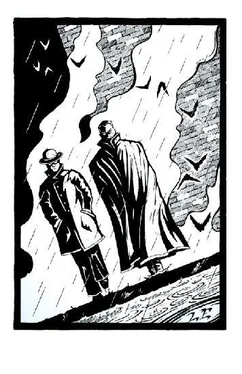“I assure you, everything I say is arrived at by the painstaking application of my methods. At the morgue I procured her clothing, which had not yet been incinerated, and her petticoats were imprinted with a faded workhouse stamp of Ste-Ursule of Nîmes. The flesh on her back, sad to say, betrayed healed scars which indicated the application of a scourge used specifically by Catholic nuns. And the condition of her hands, ingrained with blacking invisible to the naked eye, presented ample proof of her time in service. But what concerns us here primarily is the manner of her death…”
He bent over the corpse, finger tips on the rim of the coffin, exactly as he had done in the morgue, and sniffed, taking the air into his dilating nostrils in short gasps, eyes closed as if savoring its bouquet like a connoisseur of fine wine.
“The scent of putrefaction is repulsive to most individuals, quite naturally: as human beings we have bred ourselves over millennia to abhor decay. Which is a great shame, because its study I’ve found to be invaluable. Just as a tea-taster can discern subtleties in a blend that the uneducated could not possibly discern, I have trained myself over the years to be able to assess the olfactory distinctions between stages of decay. This, when combined with other observations — visual, tactile — enables me, most often, I would say invariably , to be able to pinpoint to the day, sometimes to the hour, the time of death. These are not extraordinary talents, my dear Holmes, but ones that most people could apply, given the inclination and training. Foremost, I noticed immediately the corpse had not decomposed as swiftly as it might — always a good indication of immersion in the intense cold of water. This was confirmed by finding none of the customary bruising caused by the effect of gravity on an inert mass on land — ergo, she either drowned or was committed to the Seine very soon after dying. Since there were no pre-mortem signs of violence on the epidermis, my conclusion was therefore the former.
“The wind that night was unseasonably harsh,” he continued. “Coming as it did from a south by southwest direction. The covers of the stalls were flapping and she was the last of the stall holders to leave. She was in high spirits. Perhaps she even contemplated that she might have been in love.”
“Do not tease me,” I snapped.
“On the contrary. I am delivering the facts, however shocking or unpalatable they may be. Now, do you wish me to carry on?”
I had no alternative but to nod.
“Alone now, she feels a few dots of rain in the air and opens her parasol. A new parasol from her young admirer. In a flash it is caught by a sudden gust of wind, plucked from her hands. She grasps after it, but in vain.” This he acted out in spasmodic motions. “She chases it, but it bounces away across the Quai de la Corse, taking flight, this way, that, cart-wheeling down the boatman’s steps and landing in the mud ten, fifteen yards beyond.
“And so she ventures out — but the mud is not as firm as it looks. It acts like glue. It is up to her ankles before she knows it. Frightened, she tries to extract herself, but only sinks deeper. Almost certainly she cries out for help, but nobody hears. The river level rises. Water fills her mouth, her lungs. Soon she is submerged completely.”
“This is outrageous…” I breathed.
He ignored me. “In time, buoyancy lifts her and carries her away in the predetermined arc of the current to the jetty near the Pont Ste-Beuve. The activity of the morning boats dislodges the submerged corpse once again and it travels, aided by the wash of tourist vessels and commercial traffic, lodging temporarily against the supports of the Pont Cavaignac on her way to her final port of call, the Pont Olivier Knost, where the body is spotted by passers-by and conveyed by the authorities — requiescat in pace — to its resting place, the City Morgue.”
I shook my head, struggling hard to assimilate all he had told me. Struggling to believe that such deductions were possible. Wanting to reject them as fabulous, as fictional — as another of his fanciful tales …
My doubt all too visible in my features, he explained: “Upon minute examination, I found slivers of timber in the knots in her hair. Under the microscope these fragments showed algae matching those upon the vertical struts of the jetty near Pont Ste-Beuve. I also found fragments of paint and rusted metal in a post-mortem gash on her skull, the shade of blue matching that of the Pont Cavaignac.
“After my first examination of the body in the morgue, I sent Le Bon out on a mission with three questions. One, what was the prevailing wind that night? Two, what was the color of the paint used on the Pont Cavaignac? And three: is there a factory near the Pont Notre Dame, working through the night, producing sufficient noise to cover a drowning girl’s cries for help? There was. A printer’s shop, hard at work producing the next day’s news. Upon whose pages, alas, come the morrow, the mystery of a missing flower girl did not merit so much as a single line.”
A bitter sadness rose in my throat. I was numb with astonishment, dazzled, uncomprehending, light-headed, on the brink of alarm. The feeling was not unlike love: I wanted to be seduced, I wanted to believe, to succumb — yet everything told me to protect myself from harm, to dismiss that which drew me so compulsively to it.
Poe placed a hand on my shoulder.
“There was no murder, no murderer, no rhyme nor reason, no conspiracy, no plan, no suicide…” he said. “Just the wind, the water, the mud, the current…. Sometimes Nature itself is the most devious criminal of all.”
I turned away from him and looked into the crumbling coals of the fire. The heat from it dried and prickled my eyes but I continued to stare without blinking. A coke had fallen out below me and he lifted it back into place with long-handled tongs. He was silent for a while and I was grateful for that. I heard him refill my glass of cognac and place it on the table beside my chair. The other chair opposite creaked as Poe once again occupied it and crossed his spidery legs. I had a sense of a snowy halo in my peripheral vision. The black loops of a string tie. A weak mouth. A massive brow shadowing the eyes of a nocturnal Caesar.
“Your logic is faultless except for one thing,” I said, controlling the quaver in my voice. “The parasol. It strikes me as something of a conjecture.”
“Not at all. I might conjecture that what took her out onto the mud must have been something of meaning to her, something of sentimental value, which is why she felt compelled to retrieve it. I might conjecture that, given there has been a parasol seller on the corner of the rue de Lutece for twenty years, that is what I would have given her as a gift, had I been in love. But my business is not conjecture.” He picked a small red parrot feather from his sleeve and examined it between his fingers. “I know she was the last to leave the market simply because, upon enquiry, nobody remembered seeing her leave. I spoke to the knife sharpener and he told me the only unusual thing that day was she had a parasol — one he had never seen before — and an object altogether too bourgeois for someone of her status in society. It stuck in his mind, he said, because she walked up and down like a queen, her smile radiant. He said, in fact, he’d never seen her so happy.”
Happy . The last word had a devastating effect on me. It immediately drained me of everything but remorse. The feelings I had patently kept submerged for days welled up and overwhelmed me. I could do nothing to stop them. They broke the banks and I wept like a child.
Читать дальше












